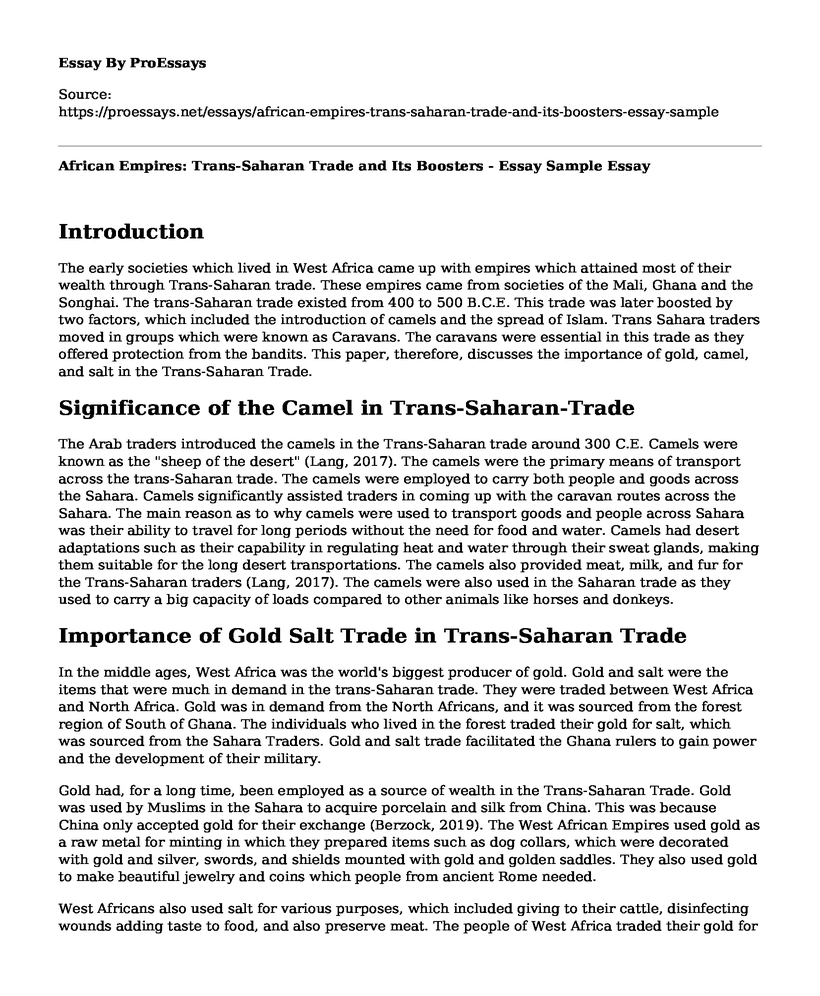Introduction
The early societies which lived in West Africa came up with empires which attained most of their wealth through Trans-Saharan trade. These empires came from societies of the Mali, Ghana and the Songhai. The trans-Saharan trade existed from 400 to 500 B.C.E. This trade was later boosted by two factors, which included the introduction of camels and the spread of Islam. Trans Sahara traders moved in groups which were known as Caravans. The caravans were essential in this trade as they offered protection from the bandits. This paper, therefore, discusses the importance of gold, camel, and salt in the Trans-Saharan Trade.
Significance of the Camel in Trans-Saharan-Trade
The Arab traders introduced the camels in the Trans-Saharan trade around 300 C.E. Camels were known as the "sheep of the desert" (Lang, 2017). The camels were the primary means of transport across the trans-Saharan trade. The camels were employed to carry both people and goods across the Sahara. Camels significantly assisted traders in coming up with the caravan routes across the Sahara. The main reason as to why camels were used to transport goods and people across Sahara was their ability to travel for long periods without the need for food and water. Camels had desert adaptations such as their capability in regulating heat and water through their sweat glands, making them suitable for the long desert transportations. The camels also provided meat, milk, and fur for the Trans-Saharan traders (Lang, 2017). The camels were also used in the Saharan trade as they used to carry a big capacity of loads compared to other animals like horses and donkeys.
Importance of Gold Salt Trade in Trans-Saharan Trade
In the middle ages, West Africa was the world's biggest producer of gold. Gold and salt were the items that were much in demand in the trans-Saharan trade. They were traded between West Africa and North Africa. Gold was in demand from the North Africans, and it was sourced from the forest region of South of Ghana. The individuals who lived in the forest traded their gold for salt, which was sourced from the Sahara Traders. Gold and salt trade facilitated the Ghana rulers to gain power and the development of their military.
Gold had, for a long time, been employed as a source of wealth in the Trans-Saharan Trade. Gold was used by Muslims in the Sahara to acquire porcelain and silk from China. This was because China only accepted gold for their exchange (Berzock, 2019). The West African Empires used gold as a raw metal for minting in which they prepared items such as dog collars, which were decorated with gold and silver, swords, and shields mounted with gold and golden saddles. They also used gold to make beautiful jewelry and coins which people from ancient Rome needed.
West Africans also used salt for various purposes, which included giving to their cattle, disinfecting wounds adding taste to food, and also preserve meat. The people of West Africa traded their gold for salt because they did not have salt. Camels transported the salt in the form of big slabs of rock salts. The natural deposits of salt were found from places such as Awlil, Taghaza, and Idjil (Berzock, 2019).
Conclusion
The trading items in Trans-Saharan trade such as gold, salt, and camel had a lot of significances. These trading items helped the people who were taking part in the trade to coexist as they both needed items which they did not produce, which later led to the growth of the Trans-Saharan trade.
References
Berzock, K. B. (Ed.). (2019). Caravans of Gold, Fragments in Time: Art, Culture, and Exchange Across Medieval Saharan Africa. Princeton University Press.
Lang, M. (2017). Trans-Saharan Trade Routes. Cavendish Square Publishing, L.L.C.
Cite this page
African Empires: Trans-Saharan Trade and Its Boosters - Essay Sample. (2023, May 11). Retrieved from https://proessays.net/essays/african-empires-trans-saharan-trade-and-its-boosters-essay-sample
If you are the original author of this essay and no longer wish to have it published on the ProEssays website, please click below to request its removal:
- Social Class and Classism Essay Example
- Essay Sample on Cultural Taboos
- Essay Sample on Tech Savvy Kids: Unforeseen Challenges and Parental Monitoring
- Exercise Benefits for Youth and Elderly: Training Guide and Physiological Adaptations - Essay Sample
- Essay Sample on Parent Involvement in Education: Improving School Outcomes
- Black Women Leaders: Examining Empowerment Through Q-Sort Methodology - Essay Sample
- Essay Example: Ethical Dilemmas of Euthanasia and Physician-Assisted Suicide







